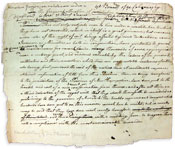Scholars in the Stacks
Meyer did not want to name his village; he wants to keep its anonymity, but he did say it’s in northeast China, in between Jilin City and the North Korean border, on the Songjiang River. The name of the village translated into English means “Wasteland.”
Meyer’s book is growing far beyond his original vision. “And I’m not sure I’m happy about that,” he said. “At the beginning I had in mind a nice slim book. Like this.” He lifted up a copy of In Patagonia, the celebrated travel book by Bruce Chatwin. (Hence the In Manchuria part of his own title.) But his findings at the library—mostly for “set pieces” as he calls them, or historical and travel descriptions of the area in China about which he is writing—have caused the manuscript to swell. One imagines this to be a common occurrence for the fellows here.
 Yet another of this year’s fellows, Matthew Stewart, recently made a discovery in the library’s archives. Stewart, an independent scholar—Strouse intends for the center to have a balance between academic-affiliated scholars and independent ones—is working on a book titled The God of the Green Mountains: On the Heterodox Origins of the American Revolution. The book will, as he described it, “examine the philosophical and religious views of, among others, Benjamin Franklin, Thomas Jefferson, Thomas Paine, Thomas Young, and Ethan Allen, the leader of the Green Mountain Boys.” The book also explores the role deism played in the American Revolution. Like many of us who learned about particular branches or subsets of religion in college years ago, I no longer had a clue what deism is. Stewart was kind enough to help. “Deism,” he explained, “involves the belief that God acts in the world only through the laws of nature. It entails the conviction that just and legitimate government is founded not on revelation or faith but on the laws of nature.”
Yet another of this year’s fellows, Matthew Stewart, recently made a discovery in the library’s archives. Stewart, an independent scholar—Strouse intends for the center to have a balance between academic-affiliated scholars and independent ones—is working on a book titled The God of the Green Mountains: On the Heterodox Origins of the American Revolution. The book will, as he described it, “examine the philosophical and religious views of, among others, Benjamin Franklin, Thomas Jefferson, Thomas Paine, Thomas Young, and Ethan Allen, the leader of the Green Mountain Boys.” The book also explores the role deism played in the American Revolution. Like many of us who learned about particular branches or subsets of religion in college years ago, I no longer had a clue what deism is. Stewart was kind enough to help. “Deism,” he explained, “involves the belief that God acts in the world only through the laws of nature. It entails the conviction that just and legitimate government is founded not on revelation or faith but on the laws of nature.”
Deism, as it turns out, led to Stewart’s fascinating find. One of the main personalities in his book is Thomas Young, a Boston doctor who has been described as “the most unwritten about man of distinction of the American Revolution.” Young was a deist, and on occasion vilified for that belief. Yet he had influential and respected friends, including Samuel Adams, who stood by him. Young’s underreported role in the Revolution?
“He played a vital role in the formation of the Boston Committee of Correspondence in 1772—arguably one of the most important organizational innovations in the effort to disseminate revolutionary propaganda and democratic practices at the time,” Stewart said. “He was heavily involved in the planning and execution of the Boston Tea Party in 1773. Indeed it seems likely that he was the first to propose in assembly the idea that the tea should be thrown into the harbor.”
What Stewart found in the archives was a cache of letters written for the Committee of Correspondence that had heretofore—because they were drafts and unsigned—been unattributed. “I recognized Young’s handwriting,” Stewart said of the letters. “I know it well. And I cross-checked the information with some other scholarship—which committee he served on, for example—and it all fits.” This only bolsters Stewart’s assertion that Young’s role in the American Revolution was far more critical than has been acknowledged.
“This research,” Stewart concluded, “will undoubtedly help me shape the narrative of my book.”
It is, one imagines, the same for the hundreds of scholars and creative writers who, since the fellowship launched twelve years ago, have benefited from what the Cullman Center provides—encouragement, extensive resources, and a room of their own.








